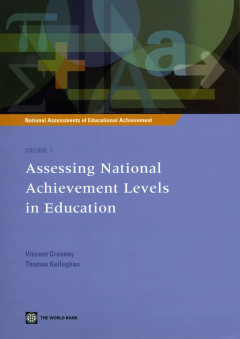Ditapis dengan

Implementing a National Assessment of Educational Achievement Volume 3
This book, focuses on state-of-the-art procedures that need to be followed in order to ensure that the data (such as test scores and background information) produced by a large-scale national assessment exercise are of high quality and address the concerns of policy makers, decision makers, and other stakeholders in the education system.
- Edisi
- -
- ISBN/ISSN
- 978-0-8213-8589-0
- Deskripsi Fisik
- xxi, 260 p. : il. ; 26 cm.
- Judul Seri
- (National Assessments of Educational Achievement)
- No. Panggil
- 371.262 IMP

Assessing national achievement levels in education
This series introduce key concepts in national assessment of student achievement levels, from policy issues to address when designing and carrying out assessment through test development, sampling, data cleaning, statistic, report writing, and the use of result of to improve educational quality.
- Edisi
- Vol. 1
- ISBN/ISSN
- 978-0-8213-7259-3
- Deskripsi Fisik
- xiii,161 hal. : 25,5 cm.
- Judul Seri
- -
- No. Panggil
- -

Using the Results of a National Assessment of Educational Achivement
The effective assessment of the perfromance of educational systems is a key component in developing policies to optimize tha development of human capital around the world. The five books in the national assessments of educational achivement series introduce key concepts in national assessments of student achivement levels, from policy issues to address when designing and carrying out assessment…
- Edisi
- -
- ISBN/ISSN
- 978-0-8213-7929-5
- Deskripsi Fisik
- xv, 167 p. : il. ; 25, 5 cm.
- Judul Seri
- -
- No. Panggil
- -
 Karya Umum
Karya Umum  Filsafat
Filsafat  Agama
Agama  Ilmu-ilmu Sosial
Ilmu-ilmu Sosial  Bahasa
Bahasa  Ilmu-ilmu Murni
Ilmu-ilmu Murni  Ilmu-ilmu Terapan
Ilmu-ilmu Terapan  Kesenian, Hiburan, dan Olahraga
Kesenian, Hiburan, dan Olahraga  Kesusastraan
Kesusastraan  Geografi dan Sejarah
Geografi dan Sejarah